
 |
|
|
|
The punk aesthetic has been raging in Tokyo for at least 45 years now, and in Japanese films the general post-modern visual attitude was taken up even earlier. Sion Sono's Why Don't You Play in Hell? might lead one to expect a transgressive horror movie, when it's really a scream of adolescent creative elation, an expression of bottled up moviemaking lust that explodes into a frenzy. The show is not "quite possibly man's greatest achievement", as touted by one fan critic, but I'll bet that for crazed J-film fans it's a heck of a party picture. What it really has going for it is enthusiasm, the kind of semi-mindless Kino Joy experienced by adolescents that picked up Super-8 cameras and felt transformed into an instant cinema great. I had that buzz at age 13 and kept it all the way until film school, a serious setting that gave me much but took away my instinctive urge to grab a camera and go wild. 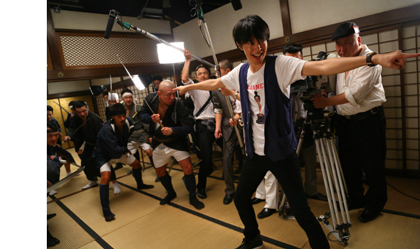
Sono's screenplay works overtime to be outrageous, considering that its aims are really sentimental. A group of teenage filmmakers that call themselves the 'Fuck Bombers' invade the streets shooting everything they see. Self-appointed director Hirata enlists a young martial-arts fanatic to be his hero, and dresses him in the yellow track suit famous from Kill Bill 1. Meanwhile, a Yakuza story runs in parallel. The popular toothpaste jingle TV spot of kiddie sensation Mitsuko Muto is pulled from the air, because of the murder conviction of her mother Shizue (Tomochika), who killed four Ikegami Yakuza hoods and wounded Ikegami (Sinichi Tsutsumi) himself. Ten years later, the F-Bombers have not made a real movie but the enthusiasm of Hirata (Hiroki Hasegawa) has not faded. He gets his big chance in an unorthodox way. Shizue's husband Muto (Jun Kinimura) still has it in for the Ikegami Gang. He has also failed to make his vain, irresponsible and criminally impulsive daughter Mitsuko (Fumi Nikaido) into a film star. To welcome Shizue home from jail, Tomo needs to film a movie with a big role for Mitsuko. As it turns out, Mitsuko is seducing/tormenting Koji (Gen Hoshino), her latest lover for the day. Koji puts the eager director Hirata in touch with Muto. The plan that will fulfill everyone's needs? Star Mitsuko in a movie about a Yakuza raid by the Mutos against the Ikegamis -- and film the real battle. 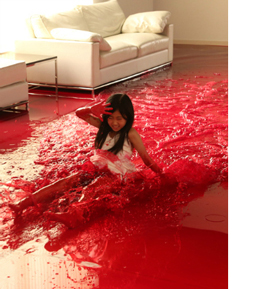
A total cultural fantasy mash-up, Why Don't You Play in Hell? combines the look of great Manga graphics (think lots of screaming faces) with the iconography and stock characters from Yakuza movies, the kind in which every jail term is exactly ten years in duration. Shion Sono's game plan isn't really all that radical, as he anchors his giddy F-Bombers in sentimentality: they revere a long-gone film projectionist and claim to be committed to film art, to the death. Hirata doesn't want to make money but to film a really really bitchin' movie that will make his name immortal. Play in Hell/ mixes up the death = success equation, in that everybody dies but everybody also lives in a glorious hereafter, bowing to the cheers of a delighted premiere audience. To these fanatics, the power of film trumps everything: reality is meaningless in comparison to fame and glory. Sono's comic-book style keeps the picture rolling at a jolly clip, although at 129 minutes it's arguably a half-hour too long. Little Nanoka Hara's toothpaste commercial and its bouncy jingle are a perfect focus for the kind of cultural madness that makes the adult Mitsuko into a dangerous diva willing to kill for fame. We first see her as a child, sliding across a room completely covered in Yakuza blood. Hirata and his gang burn calories leaping and shouting in the streets, reveling in glory they perceive but haven't achieved: spirit is everything. No-neck Detective Kimura (Tetsu Watanabe) screams at cool cat Yakuza boss Muto, while Yakuza boss Ikegami has gone totally nuts over Mitsuko and that old toothpaste jingle. The common aspect of all these silly characters is a sense of personal joy -- usually accompanied by a goofy smile -- and transcendent delight. 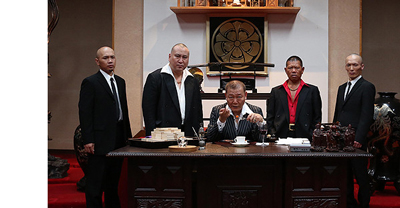
The details are a lot messier, as Why Don't You Play in Hell? is a commercial film and the target audience demands over-the-top content. The continuously agog Koji falls in love with Mitsuko while watching her stuff broken glass into the mouth of her previous unfaithful conquest. She then kisses the unlucky guy hard on the lips. Fights break out without warning. The tough-guy Yakuza goons play their parts straight even when they're called upon to indulge oddball behaviors, like giving two youngsters privacy for their first kiss. The film has no sex and no nudity, and even that kiss is delayed -- perhaps just in the spirit of the unexpected. The final battle is fought for real but also staged, with participants pausing for camera changes. With CGI blood spurting in all directions, and hands, feet and heads flying through the air, the show turns into a violent nonsense cartoon. Nothing that happens is shocking but the context is certainly weird, what with a musical rhythm bed rumbling through that could be from The Gypsy Kings. Our favorite character loses an arm and gets a sword struck through his head, yet behaves as if he's been tapped in a game of tag. The enemy clan chief is eager for a big death at the hands of Mitsuko Muto, as he's her biggest fan. The filmmakers earlier dropped a few cinephile names, like that of cameraman Eugen Shufftan when they're playing pool -- the reference is Rossen's The Hustler. Cinema greatness in this film, however, is a Tarantino bloodbath where everybody dies, yet everything's cool because it's gonna be a great movie. 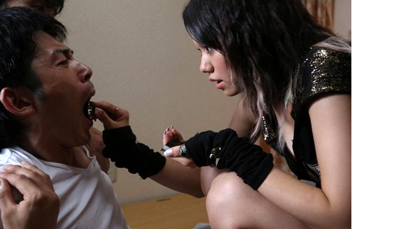
The film's ecstatic faces and party atmosphere are infectious. Through all the violent nonsense Sono succeeds in communicating the 'zing' feeling of amateur moviemaking, the kind we all remember from high school or perhaps college. Hirata leaps up and down pumping up his 'action star!' pal to get into Bruce Lee mode. When the bratty Mitsuko gets the 'star' position and attention to which she feels she's entitled, she explodes with energy. I especially responded to the final shot of Hirata walking in ecstasy, carrying bags of exposed film and camera magazines with his magic footage, the undeveloped gold that will make him a superstar. That's the feeling every amateur filmmaker had coming back from the lab -- or drugstore -- with little reels of film that just might be the best movie ever made. Drafthouse and Cinedigm's Blu-ray of Why Don't You Play in Hell? is a sharp digitization of this candy-colored mix of movie madness and Yakuza mayhem. Reportedly filmed on the Red Epic Camera system, the picture has a film look, if one remembers the (now extinct) glowing hues of old Fujichrome. Hirata's tireless camera cohorts go crazy with their cameras, but director Sono's visual sense is almost old fashioned, going for tight compositions and bold close-ups. Taking the prize for most photogenic actor is Jun Kunimura, a veteran who also appeared in both parts of Kill Bill; he can look like a mean mother but also gives out with heartwarming smiles. Besides a trailer, the one extra is a post-screening discussion with director Sono and a book publisher, and some theatrical trailers. A color souvenir booklet has illustrations from the film, including Koji's cocaine-induced image of blood-fountains turned rainbow colors. This is accompanied by a fold-out poster featuring cartoon art by James "Barf" Callahan. 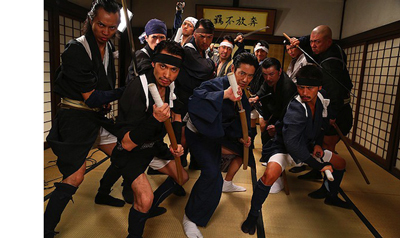
As a non-follower of the latest Asian genre cinema trends I confess to not having heard of Shion Sono, James "Barf" Callahan or Why Don't You Play in Hell? until a few days ago. That's great, as when possible I like to see unknown-quantity movies like this knowing nothing about them; nothing's better than being overwhelmed by something new and exciting while in a state of virgin ignorance. From the title, promos and ads I expected the show to be a gross-out horror effort, maybe a zombie movie with a supernatural theme. Why Don't You Play in Hell? turned out to be a cheerfully violent comic farce aimed at a specialized audience.
On a scale of Excellent, Good, Fair, and Poor,
Why Don't You Play in Hell? Blu-ray

The version of this review on the Savant main site has additional images, footnotes and credits information, and may be updated and annotated with reader input and graphics.
Review Staff | About DVD Talk | Newsletter Subscribe | Join DVD Talk Forum |
| ||||||||||||||||||